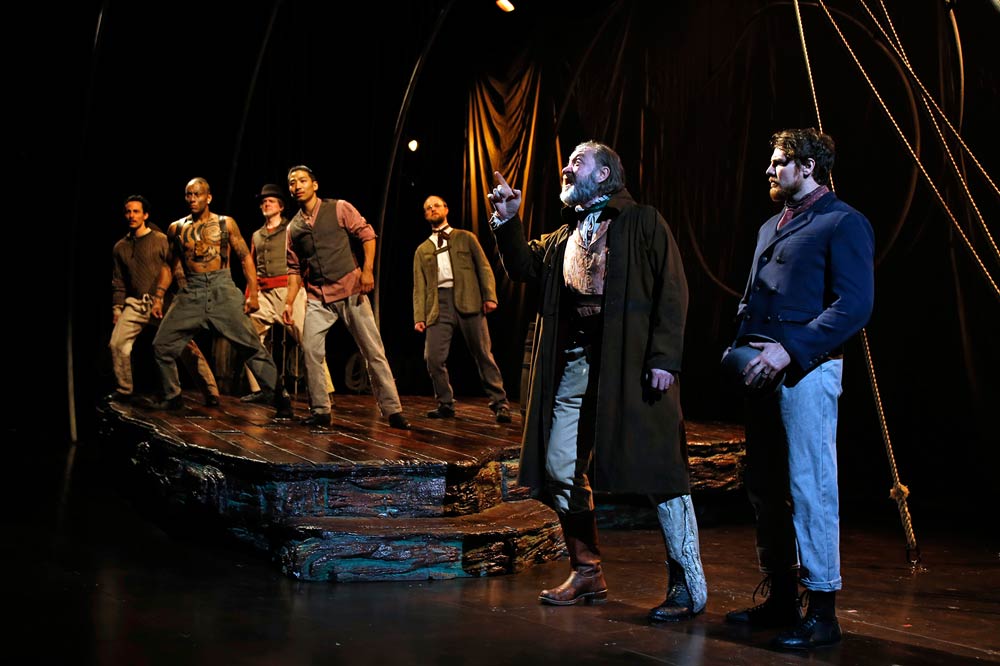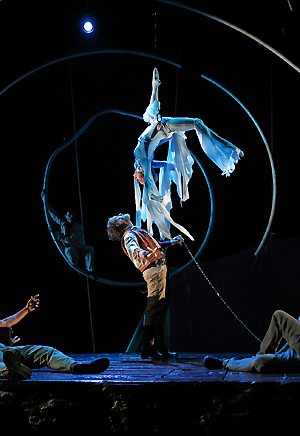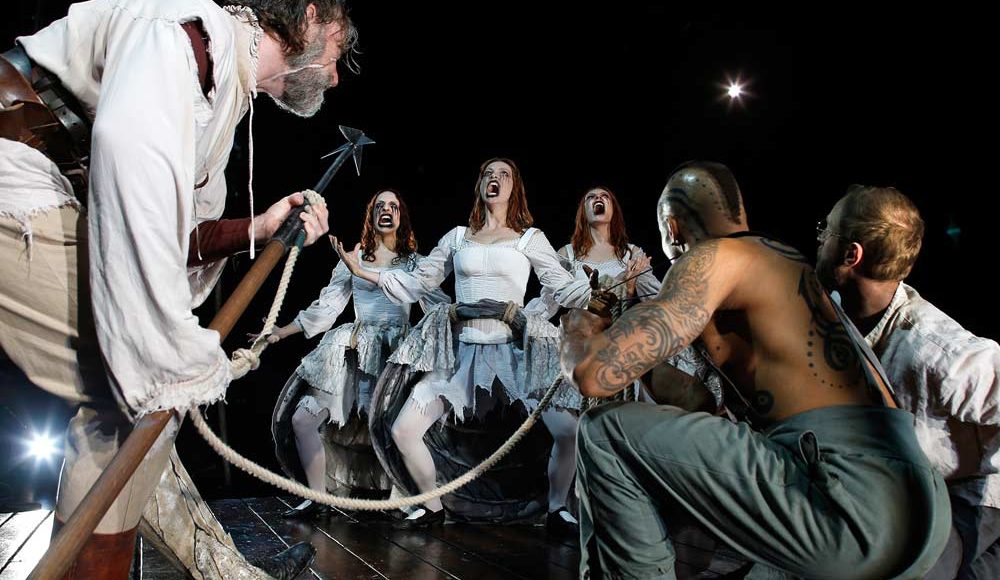Going into South Coast Repertory’s production of adapter/director David Catlin’s Moby Dick, based on the novel by Herman Melville, I immediately encountered a red flag in the program notes by Kat Zukatis with the opening line: “Let’s all agree: Moby-Dick is a terrible novel.”
My lovely wife Marlene and I quickly agreed that we didn’t agree with that statement, and that Zukatis’ program note was one of the worst we had ever encountered.
Catlin, as well as a number of those in the ensemble and production crew of Moby Dick, is part of Chicago’s renowned Lookingglass Theatre Company.
(NOTE: Lookingglass was founded in 1988 by Catlin and others including David Schwimmer, (Ross of Friends’ fame). The company emerged, and took its name, from a 1987 production of Alice Through the Looking Glass, which Schwimmer directed.)

Lookingglass Theatre Company’s production of Moby Dick adapted by David Catlin (Photo by Debora Robinson/SCR)
Catlin, who first mounted Moby Dick in 2015, has retained both lightscape and sound score by William C. Kirkham and Rick Sims respectively as well as the set by scenic designer Courtney O’Neill, and one can see the wisdom in this as they provide both foundation and support for Catlin’s adaption.
Melville’s novel is a challenging and stunningly intricate work, a demanding bipolar narrative of divided Ishmaels, and the mad Ahab’s consciousness struggling with that of the hero/observer for possession of the reader’s soul.
The tome reflects that duality, with divisions pairing chapters crowded with frantic activity and others of ranging exposition and delving speculation; all in an intricately webbed vocabulary drawing its strands from seamen’s slang, Shakespeare, and the Old Testament.
There’s even a sense of Dante in Melville’s use of the Pequod’s meeting with nine other ships as each encounter furthers Ahab’s descent into the Inferno.
Moby-Dick had critical success when it first appeared, but this was not reflected in book sales. The book would earn Melville $1,260 during his lifetime; both he and his writing would sink into obscurity after his death in 1891.
The British author E. M. Forster was among the literary greats of the 1920’s who participated in what would come to be known as the Melville Revival, to bring the American author’s works back into print after long decades.
Forster was quoted as saying, “Moby-Dick is full of meanings: its meaning is a different problem.”
The Lookingglass is known for the visual excitement of their acrobatic staging, and Catlin has used his whole bag of tricks in addressing the dilemma of the “fullness” Forster spoke of.
There are layers of Cirque de Soleil, of Stomp, of Kartuli dance techniques, of biomechanics, of steampuck and of Vegas with nods towards both Peter Brooks and Jerzy Grotowski.

Micah Figueroa (background), Christopher Donahue and Cordelia Dewdney (Photo by Debora Robinson/SCR)
Christopher Donahue reprises his role of Ahab; Jamie Abelson plays Ishmael to Anthony Fleming III’s robust Queequeg. Walter Owen Briggs portrays the conflicted Starbuck with Raymond Fox, Micah Figueroa and Javen Ulambayer filling out the rest of the Pequod’s crew.
Kelley Abell, Cordelia Dewdney and Kasey Foster serve as the women they leave in New Bedford, the sea that lures them and finally the whale that brings them to their fate.
Every demand that Catlin puts before the ensemble they handily meet, but at the outset Catlin seems unable to meet those demands before him.
For what ever reason, Catlin starts off the first act with a lightness more suited to musical comedy than Melville’s prophetic opera on the horrors found in the depths of the sea and within man himself.
Whatever the issues he was facing, perhaps an unnecessary concern over connecting the audience to the material, Catlin resolves them in time to imbue the second act with Melville’s gravitas and his own artistry which, equally balanced in spectacle and beauty, provides a fitting presentation of the great American novel.
And Catlin’s Moby Dick may now join the ranks of John Barrymore’s performance in the silent classic The Sea Beast and Ray Bradbury’s screenplay for the John Huston film, as worthy pursuers of the great white whale.
* * *
WHAT
MOBY DICK
adapted and directed by David Catlin
from the novel by Herman Melville
WHEN
January 20 – February 19, 2017
WHERE
South Coast Repertory
Segerstrom Stage
655 Town Center Drive,
Costa Mesa, CA 92628
TICKETS & INFORMATION
http://www.scr.org/
Phone: (714) 708-5555




